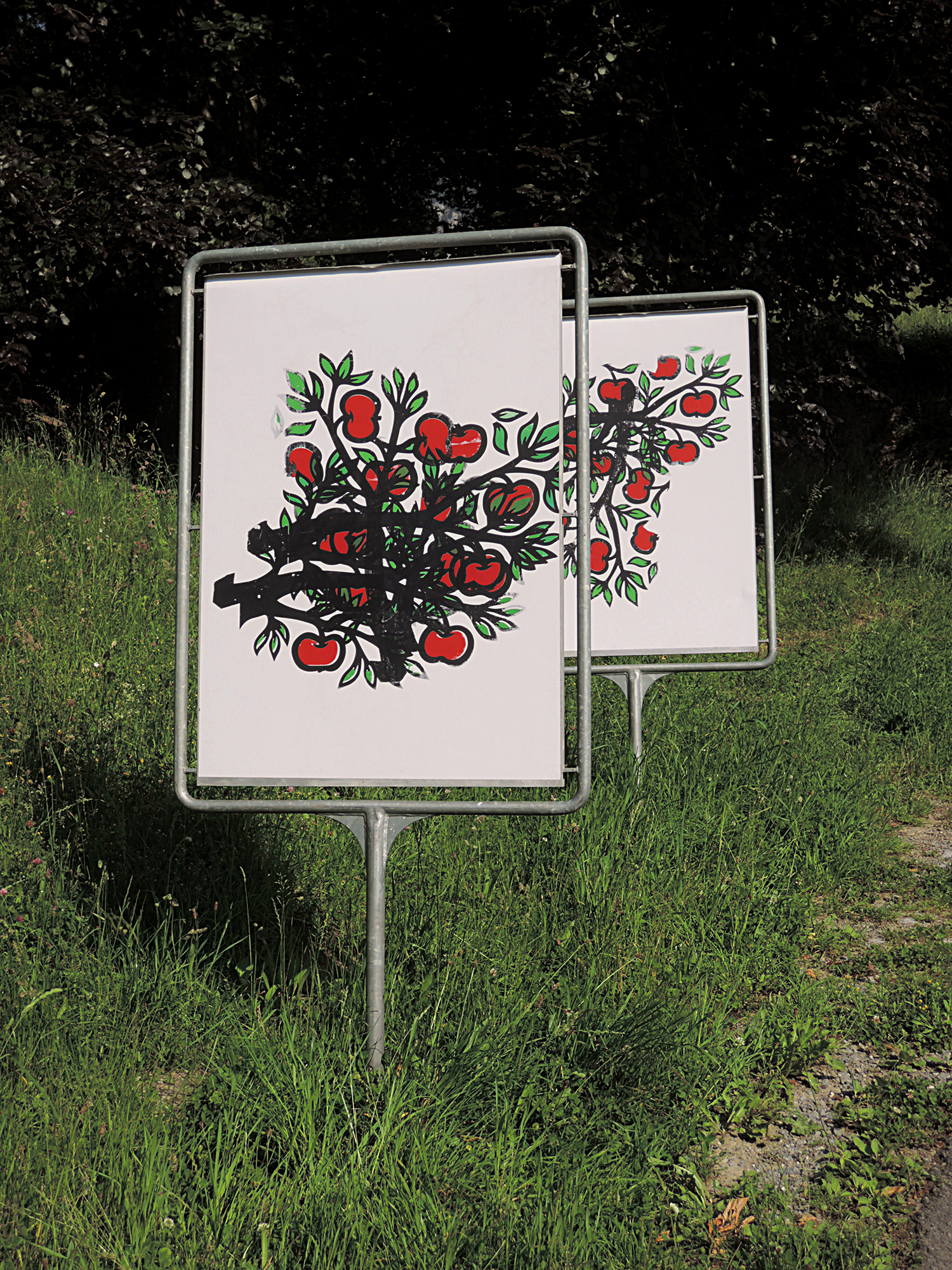︎ ︎︎
Alphabétisation de l’autarcie, 2014
Billboards, screen-print
200x105x3.5 (x6)
Photo credit: David Gagnebin-de Bons
“Making our way through the exhibition, we come across posters showing apple trees. These resort to an iconographic image regularly used by Switzerland to symbolize the country’s prosperity. Pascal Schwaighofer replays this well-known image and, without losing its appearance code, he shifts it into the realm of art. The apples and trees are repeated, silkscreened, emptied of the political message so-to-speak flattening them: as such, they can be seen for what they are—images whose content is highly symbolic and much imbued with history. As the tree of knowledge and the paragon of the fruit trees, the apple tree is and marvelous illustration of the expression “fruit-bearing”: with its ever-red apples, smooth and appetizing, it is living proof that the world continues to go round.This image of prosperity harks back to the history of the Szillassy Park and its first inhabitants, the Hope and Szilassy (of English and Hungarian origins) families, whose plans for landscaping the site were accompanied by the utopian dream of becoming self-sufficient and remaining politically free. Thus the Park space reflects the image of Switzerland at voting times: a prosperous but isolated (or prosperous because isolated, depending on one’s interpretation) country whose identity has been shaped by fictions to which it dearly clings.Perhaps one of this artist’s objectives might be to deconstruct such images in order to re-inject them with some meaning. Pascal Schwaighofer often works in connection with representations of Nature (geology, botany). That is to say, his works question the different narrative layers composing them, their historic content, and their geopolitical and philosophic implications.”
Billboards, screen-print
200x105x3.5 (x6)
Photo credit: David Gagnebin-de Bons
“Making our way through the exhibition, we come across posters showing apple trees. These resort to an iconographic image regularly used by Switzerland to symbolize the country’s prosperity. Pascal Schwaighofer replays this well-known image and, without losing its appearance code, he shifts it into the realm of art. The apples and trees are repeated, silkscreened, emptied of the political message so-to-speak flattening them: as such, they can be seen for what they are—images whose content is highly symbolic and much imbued with history. As the tree of knowledge and the paragon of the fruit trees, the apple tree is and marvelous illustration of the expression “fruit-bearing”: with its ever-red apples, smooth and appetizing, it is living proof that the world continues to go round.This image of prosperity harks back to the history of the Szillassy Park and its first inhabitants, the Hope and Szilassy (of English and Hungarian origins) families, whose plans for landscaping the site were accompanied by the utopian dream of becoming self-sufficient and remaining politically free. Thus the Park space reflects the image of Switzerland at voting times: a prosperous but isolated (or prosperous because isolated, depending on one’s interpretation) country whose identity has been shaped by fictions to which it dearly clings.Perhaps one of this artist’s objectives might be to deconstruct such images in order to re-inject them with some meaning. Pascal Schwaighofer often works in connection with representations of Nature (geology, botany). That is to say, his works question the different narrative layers composing them, their historic content, and their geopolitical and philosophic implications.”
Text by Isaline Vuille in BEX&ART 2014

